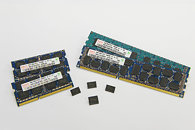- Joined
- Oct 9, 2007
- Messages
- 47,538 (7.47/day)
- Location
- Hyderabad, India
| System Name | RBMK-1000 |
|---|---|
| Processor | AMD Ryzen 7 5700G |
| Motherboard | ASUS ROG Strix B450-E Gaming |
| Cooling | DeepCool Gammax L240 V2 |
| Memory | 2x 8GB G.Skill Sniper X |
| Video Card(s) | Palit GeForce RTX 2080 SUPER GameRock |
| Storage | Western Digital Black NVMe 512GB |
| Display(s) | BenQ 1440p 60 Hz 27-inch |
| Case | Corsair Carbide 100R |
| Audio Device(s) | ASUS SupremeFX S1220A |
| Power Supply | Cooler Master MWE Gold 650W |
| Mouse | ASUS ROG Strix Impact |
| Keyboard | Gamdias Hermes E2 |
| Software | Windows 11 Pro |
Did you buy computers or other consumer electronics with DRAM chips in it between 1998 and 2002? Chances are, that you've been done over by organized price-fixing by DRAM manufacturers that made computers and consumer electronics costlier than they should have been. An online claim portal sprung up in accordance with the ruling in the DRAM Indirect Purchaser Antitrust Litigation, which lets the general public (you) file a claim, seeking compensation from DRAM manufacturers.
A typical successful claim should entitle you to a compensation of $10, but in certain cases, the compensation can go as high as $1,000. Documentation (proof of purchase) is not required, but the site advises you to hold on to any documentation that you have, apart from the equipment itself. The litigation covers "indirect purchasers" only, which includes people who purchased pre-built PCs, laptops, mobile phones, game consoles, and graphics cards. People who directly purchased DRAM from DRAM makers (such as aftermarket DRAM modules), aren't eligible. However, you could argue in your claim that even while you purchased your modules from, say, OCZ, that company sourced DRAM chips from, say, Hyundai (Hynix) or Samsung, making it an "indirect purchase." Be imaginative. Get the online claims form, along with other FAQs here.

A video presentation follows.
View at TechPowerUp Main Site
A typical successful claim should entitle you to a compensation of $10, but in certain cases, the compensation can go as high as $1,000. Documentation (proof of purchase) is not required, but the site advises you to hold on to any documentation that you have, apart from the equipment itself. The litigation covers "indirect purchasers" only, which includes people who purchased pre-built PCs, laptops, mobile phones, game consoles, and graphics cards. People who directly purchased DRAM from DRAM makers (such as aftermarket DRAM modules), aren't eligible. However, you could argue in your claim that even while you purchased your modules from, say, OCZ, that company sourced DRAM chips from, say, Hyundai (Hynix) or Samsung, making it an "indirect purchase." Be imaginative. Get the online claims form, along with other FAQs here.

A video presentation follows.
View at TechPowerUp Main Site





